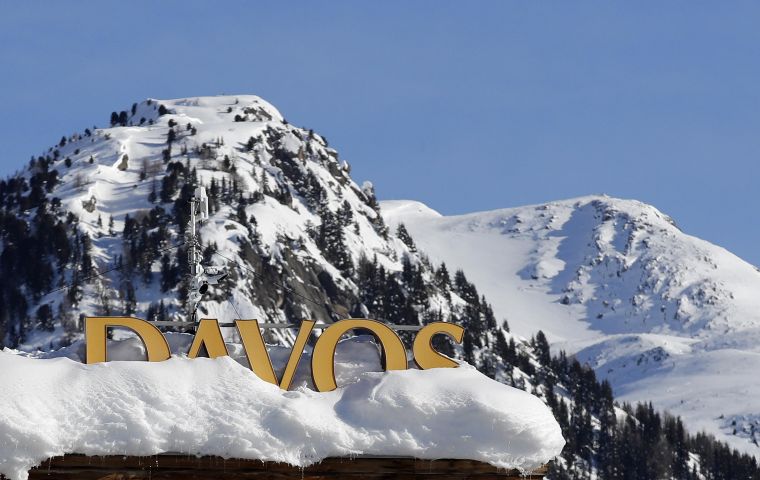MercoPress. South Atlantic News Agency
Even the richest of the richest now admit climate change is an existential threat
 Most of Davos audience are owners or senior managers of businesses with a global reach, and their views on economic issues often chime with Trump's.
Most of Davos audience are owners or senior managers of businesses with a global reach, and their views on economic issues often chime with Trump's. By Gwynne Dyer – Donald Trump's speech to the World Economic Forum in Davos on Monday contained no surprises: half an hour of chest-thumping self-praise, although without the usual xenophobia and dog-whistle racism. It was, after all, an audience of the ultra-rich and powerful in which most of the movers and shakers were not American.
There was no point in insulting them, and he didn't. Presumably for the same reason, he downplayed his climate denial at a conference whose theme this year is sustainability: just two minutes denouncing climate scientists as “the heirs of yesterday's foolish fortune tellers,” and then back to the boasting. But you couldn't help wondering what the audience was thinking.
Most of them are owners or senior managers of businesses with a global reach, and their views on economic issues often chime with Trump's. In the past they echoed his views on climate change as well, because taking it seriously threatened their business models, but they are not stupid.
Some of them always knew the science was right, and just muddied the waters deliberately to win a few more decades of profit. Others drank the Kool-Aid and truly believed for a while that it was a Chinese-sponsored hoax, but they know it's not the Chinese who are melting the glaciers and setting Australia on fire.
So a majority of the people in that audience now realize that the climate threat is very real, and some are starting to take serious action against it. One of the world's three biggest asset-management firms, BlackRock, has just started pulling its investments out of the coal industry. It's a small start, and it's very late, maybe too late, but the wind is clearly changing.
Over the past few months Goldman Sachs, Liberty Mutual, and the Hartford Financial Services Group, Inc., have all taken similar steps. The European Investment Bank has announced that it will stop lending to fossil-fuel projects altogether. But beyond wondering when and how to take their own businesses in the same direction, a lot of the CEOs at Davos will be asking themselves: is it time to start shredding the evidence?
I am speaking metaphorically, of course. There are doubtless still megatons of paper documents that contain incriminating material about how companies deliberately subsidized climate denial campaigns in the past, but much of it was 'restricted circulation' and never saw a photocopier. Just call in the shredders. But the real problem is the electronic evidence.
There will be metaphorical tons of damning internal email chatter about how a great many companies conspired to cast doubt on the scientific evidence for global warming over a period of several decades. Tracking it down and killing it will be very hard. In fact, it will be close to impossible.
People do what they have to in order to make a living. Many people who profoundly disapproved of what the guilty companies were doing nevertheless took the job and kept their mouths shut. But a few of them, at least, will have been quietly saving documents and emails for the day when the lawsuits start.
In fact, the class-action lawsuits are already getting underway, especially in the world's most litigious country, the United States. It's unexplored legal territory, and it may be some time before one of the cases makes it in court, but the model everybody has in mind is the Tobacco Master Settlement of 1998, in which the four major cigarette companies ended up paying out US$ 206 billion over 25 years.
They were also legally obliged to stop advertising aimed at young people, limit their lobbying, and fund antismoking campaigns. That was a case where the main victims were people who actually used their products. The public pressure to punish companies whose activities have harmed everybody's future will be far greater: if new and retrospective legislation is required, it will be passed.
In this case, we are not just talking about fines, although they may ultimately be immense and even crippling. We are also talking about criminal liability.
Even if we finally start taking serious measures against global warming now, a lot of people are going to die from the damage that has already been done: millions at least, and possibly a great many more than that.
Most of them will live in developing countries, and have no access to the legal systems of the countries where the headquarters are. But enough people will die in the rich countries that those who led or financed the denial campaign will almost certainly end up facing criminal charges ten or twenty years from now. Time to get shredding.




Top Comments
Disclaimer & comment rules-

Read all commentsThis is going to get very ugly very quickly once it starts. Entire companies headed by knowingly-culpable malefactors are going to see the entirety of their assets confiscated by governments to combat the extinction such companies promoted and accelerated. DESERVEDLY.
Jan 25th, 2020 - 08:39 pm 0The sooner the better, because it's better to not be extinct.
Commenting for this story is now closed.
If you have a Facebook account, become a fan and comment on our Facebook Page!